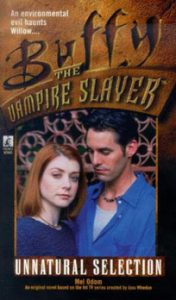I’ll have good things to write about Mel Odom’s Buffyverse work when I get to the “Angel” novels, but he makes an inauspicious debut with the young-adult entry “Unnatural Selection” (June 1999). It’s somewhat of a mystery story, which is rare among “Buffy” TV episodes, and there is a nice scene of Buffy and Angel going undercover to interview a witness, but Odom doesn’t quite commit to the genre.
Xander is investigating the kidnappings of children of Gallivan Industries employees with his friend Hutch, but after a plot twist, that thread dies out. Giles learns from a Watcher friend that an historic lantern is the key to ending the infestation of faeries, changelings and vampires, so he just surmises where it will be and digs it up.
Willow is out of character, as she leads a group of protestors against Gallivan’s proposal to turn Weatherly Park into an amusement park, even taking the mic and speaking in front of a crowd. That doesn’t fit with the Willow from “The Puppet Show” (1.9) who is scared of public speaking. Cordelia’s favoring of the amusement park doesn’t seem to be in character, either. I do like the idea of Willow caring about her hometown, though; too often we get the feeling that Sunnydale is “Buffy’s town” because we see her patrolling it, but actually, it’s Xander, Willow, Cordy and Oz who grew up there.
Odom touches on some interesting ideas but doesn’t dig far enough into them. For example, Xander has a new friend, Hutch, whom he meets at the comic-book store in the mall. It is neat to see Xander interacting with a guy, and defending Cordelia’s and Willow’s honor when Hutch gets crass. This might’ve been a good opportunity for him to reflect on the loss of his old buddy, Jesse, who was supposedly tight friends with Xander and Willow before Buffy got to town, but who isn’t mentioned after his death in “The Harvest” (1.2).
Giles talks with the German Watcher Desmond, who we’re told is the Watcher of a former active Slayer – quite a knowledge bomb to drop without learning that Slayer’s name or anything else about her. Since Giles and Desmond are “the deepest friends” (page 144) yet have different beliefs in the relative value of Slayers, it would be fascinating to hear a debate between them. Although it’s a crass viewpoint, Desmond’s notion that a Slayer is just a small cog in the fight against evil seems logical, as she can only be in one place at a time.
The continuity is – as usual with the book series – off base, but it’s more inexcusable here because this book was released late in Season 3’s airing. Odom probably wrote it in the summer of 1998, as all the usual errors are present. Xander and Cordy are still a couple even though the Spring Blow-Out dance is approaching. We could retroactively make it a Fall Blow-Out and “Unnatural Selection” could fit between “Revelations” (3.7) and “Lovers Walk” (3.8). But another problem is that the faeries are new to the gang here, even though they also face them in “Child of the Hunt” (also set during early Season 3), where they are also a new menace.
The fight scenes in “Unnatural Selection” don’t tie into any bigger theme or character motivations, making them a slog to read. And despite toying with environmental ideas, Odom is unable to find an overarching theme. The author ends the book with Buffy reflecting that for a few hours, she and Angel can be a normal couple – something that is old hat for the series and not central to this story.
Click here for an index of all of John’s “Buffy” and “Angel” reviews.


